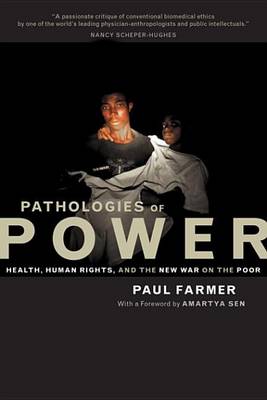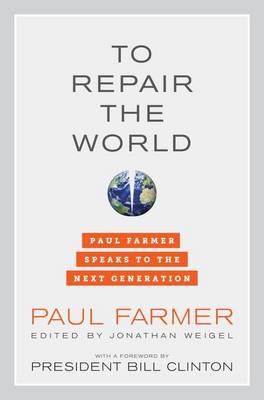California Public Anthropology
2 primary works
Book 4
Pathologies of Power uses harrowing stories of life--and death--in extreme situations to interrogate our understanding of human rights. Paul Farmer, a physician and anthropologist with twenty years of experience working in Haiti, Peru, and Russia, argues that promoting the social and economic rights of the world's poor is the most important human rights struggle of our times. With passionate eyewitness accounts from the prisons of Russia and the beleaguered villages of Haiti and Chiapas, this book links the lived experiences of individual victims to a broader analysis of structural violence. Farmer challenges conventional thinking within human rights circles and exposes the relationships between political and economic injustice, on one hand, and the suffering and illness of the powerless, on the other. Farmer shows that the same social forces that give rise to epidemic diseases such as HIV and tuberculosis also sculpt risk for human rights violations. He illustrates the ways that racism and gender inequality in the United States are embodied as disease and death. Yet this book is far from a hopeless inventory of abuse.
Farmer's disturbing examples are linked to a guarded optimism that new medical and social technologies will develop in tandem with a more informed sense of social justice. Otherwise, he concludes, we will be guilty of managing social inequality rather than addressing structural violence. Farmer's urgent plea to think about human rights in the context of global public health and to consider critical issues of quality and access for the world's poor should be of fundamental concern to a world characterized by the bizarre proximity of surfeit and suffering.
Farmer's disturbing examples are linked to a guarded optimism that new medical and social technologies will develop in tandem with a more informed sense of social justice. Otherwise, he concludes, we will be guilty of managing social inequality rather than addressing structural violence. Farmer's urgent plea to think about human rights in the context of global public health and to consider critical issues of quality and access for the world's poor should be of fundamental concern to a world characterized by the bizarre proximity of surfeit and suffering.
Book 29
Here, for the first time, is a collection of short speeches by the charismatic doctor and social activist Paul Farmer. One of the most passionate and influential voices for global health equity and social justice, Farmer encourages young people to tackle the greatest challenges of our times. Engaging, often humorous, and always inspiring, these speeches bring to light the brilliance and force of Farmer's vision in a single, accessible volume.
A must-read for graduates, students, and everyone seeking to help bend the arc of history toward justice, To Repair the World: challenges readers to counter failures of imagination that keep billions of people without access to health care, safe drinking water, decent schools, and other basic human rights; champions the power of partnership against global poverty, climate change, and other pressing problems today; overturns common assumptions about health disparities around the globe by considering the large-scale social forces that determine who gets sick and who has access to health care; discusses how hope, solidarity, faith, and hardbitten analysis have animated Farmer's service to the poor in Haiti, Peru, Rwanda, Russia, and elsewhere; and leaves the reader with an uplifting vision: that with creativity, passion, teamwork, and determination, the next generations can make the world a safer and more humane place.
A must-read for graduates, students, and everyone seeking to help bend the arc of history toward justice, To Repair the World: challenges readers to counter failures of imagination that keep billions of people without access to health care, safe drinking water, decent schools, and other basic human rights; champions the power of partnership against global poverty, climate change, and other pressing problems today; overturns common assumptions about health disparities around the globe by considering the large-scale social forces that determine who gets sick and who has access to health care; discusses how hope, solidarity, faith, and hardbitten analysis have animated Farmer's service to the poor in Haiti, Peru, Rwanda, Russia, and elsewhere; and leaves the reader with an uplifting vision: that with creativity, passion, teamwork, and determination, the next generations can make the world a safer and more humane place.

